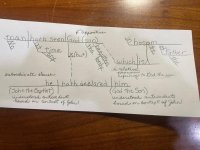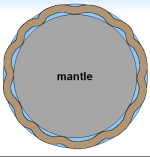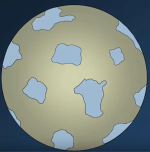No worries.
Then you can't very well dismiss it without any reasoning given.
You still haven't given any reason why it cannot be BOTH/AND.
Put yourself in God's shoes for a moment (figuratively speaking, of course). If you were starting to form a paradise where the creatures you have yet to create would live, wouldn't you call it "Heaven"? Especially if there was no corruption in it?
Looking back at the Bible having been written in the past, knowing that God lives in Heaven, and that we in the Body of Christ are citizens of Heaven (and not of Earth), and that there will be a new Heaven and a new Earth, BOTH of which will be paradises, would one not be able to draw a parallel between God calling the Earth, where there had never been corruption, or judgement of sin, "Heaven"?
Heaven refers to both Earth (the planet) prior to the fall, synecdochally, but specifically, to the firmament God made that divided the waters above from the waters below.
If HPT is true, then it's the brown band between the two blue circles here in this cross-section of earth on day 2:
View attachment 11551
And then in this cross section of the earth on day 3:
View attachment 11553
Does it make sense, at least?
Whether you accept it or not is irrelevant here. Is what is depicted in contradiction with Scripture? Or does it comport to what Scripture says?
That's our modern definition for "formless."
Here is "tohu." Look at how the word is used, and how it's translated:
Strong's h8414
- Lexical: תֹּהוּ
- Transliteration: tohu
- Part of Speech: Noun Masculine
- Phonetic Spelling: to'-hoo
- Definition: formlessness, confusion, unreality, emptiness.
- Origin: From an unused root meaning to lie waste; a desolation (of surface), i.e. Desert; figuratively, a worthless thing; adverbially, in vain.
- Usage: confusion, empty place, without form, nothing, (thing of) nought, vain, vanity, waste, wilderness.
- Translated as (count): in vain (2), of confusion (2), useless (2), and confusion (1), and in the wasteland (1), and worthless (1), by empty (1), empty (1), empty things (1), for nothing (1), formless (1), in a wilderness (1), in the wilderness (1), nothing (1), nowhere (1), the empty space (1), without form (1). |
Then you need to show where it conflicts, because I'm not seeing it!
Until you consider that it's referring to the paradise God was about to create... Then it makes perfect sense to call "Earth" "Heaven"!
I think I'm correct. So there.
Derf, could I ask you to not include phrases like "I think... [insert opinion about my postion here]" like the above in your responses?
It doesn't contribute anything to the conversation, and it makes it seem like all you have is opinions, but nothing factual. (cf 1 Peter 3:15; Proverbs 27:17; Matthew 5:37)
When I said "it introduces problems, I should have clarified, "for your position."
It makes no difference whether it stands alone or is part of Day 1 on my position, because my position doesn't require your previously stated rule regarding the "the" article in Hebrew.
In other words, it's completely irrelevant to my position whether it's simply an introduction and also/or just part of day 1. It makes no difference, because of the reasons I've outlined previously.
Except that it's not "the earth" (haares) that He's naming "Earth" (eres).
It's "the dry land" (layyabbasah) that He names "Earth" (eres).
You can't have your cake and eat it too.
PLEASE ANSWER: What verse (in Genesis 1) describes God creating "the earth" which in verse 2 is "formless and void"? IOW: Did "the earth" have a beginning? If so, how long did it exist before God started "Day 1," and where is it's creation described in Genesis 1?
This is a historian fallacy.
The ancients (including the authors of the Bible) didn't know what "gravity" or what "Lagrange points" or what "space" was.
They knew "the direction away from the ground" = "up".
They knew "the direction towards/into/below the ground" = "down".
Everything written by the ancients is written within that context.
Hmmm, what else is a circle...
*cough*the earth's*cough*crust*cough cough*

I'll concede this point.
That's not good enough to establish your position, or to discredit mine, for that matter.
Wouldn't that just be confirmation bias?
Most of the uses of "the deep" are post-Flood.
But this also sort of misses the point.
I'm talking about "the deep" pre-Flood. Pre-day-2, for that matter.
If "the deep" of Genesis 1:2 just means deep water, and something is made in the midst of the water, dividing the waters below from the waters above, then "the deep" is no longer "deep" in and of itself, but it's still (at that point) below "the waters above...", is it not?
And since it's still "below," (iow, not "the waters above the firmament") what are the "storehouses" referring to in this verse?
He gathers the waters of the sea together as a heap;He lays up the deep in storehouses.
He gathers the waters of the sea together as a heap; He lays up the deep in storehouses.

www.biblegateway.com
And what are "the doors" referring to in this passage? Especially given the figure of speech used "the womb" which often refers to the depths of the earth (the reverse being used often as well, as a corollary figure of speech), as well as it "bursting forth"?
“Or who shut in the sea with doors,When it burst forth and issued from the womb;
“Or who shut in the sea with doors, When it burst forth and issued from the womb;

www.biblegateway.com
But it's not consistent with the rest of them.
Again, I point to the qualifying phrase vs the lack thereof for "the firmament."
Thank you.
What evidence would defeat your position?
Supra.
Uh, no...?
This is going to get complicated, but it's the best way to show what I'm talking about as clear as I can.
God (through Moses) ties "haraqia" (the firmament) to "samayim" (Heaven), with raqia being used 5 times prior to that, with NO qualifying phrase. (None is needed.) The five times "raqia" is used are as follows (direct Hebrew to English translation) (verse number):
"yehi raqia" ([let there be] [firmament*]) (1:6)
"wayyaas elohim et-haraqia" ([so made] [God] [-] [the firmament**]) (1:7)
"mittahat laraqia" ([under] [the firmament**]) (1:7)
"meal laraqia" ([above] [the firmament**]) (1:7)
"wayyiqra elohim laraqia samayim" ([and called] [God] [the firmament**] [heavens***]) (1:8)
Within 3 verses, you have five uses of the word "raqia"
Notice:
* "let there be firmament"; there is no article for "raqia" here
** "the firmament" is used four times, all referring to the same "firmament" of verse 6
*** "the firmament" of verse 6 is called "heavens"
Following this, in verse 9, Moses uses "hassamayim" (the heavens) but DOES NOT tie it to "raqia," but rather to "the waters," which are defined as being below "hassamayim," the phrase being "yiqqawu hammayim mittahat hassamayim" ([let be gathered together] [the waters] [under] [the heavens]).
The next time we see "hassamayim" is a few verses later in verse 14, where we both agree that God is making things up in the sky. With this, we see not "haraqia" but a prepositional phrase "birqia hassamayim" ([in firmament] [the heavens]).
This same phrase, "birqia hassamayim" ([in firmament] [the heavens]) appears two more times, once in verse 15, and again in verse 17.
The last use of "hassamayim" is in verse 20, in the prepositional phrase "al-pene reqia hassamayim" ([across] [face] [firmament] [the heavens]).
The last four uses of raqia are "[firmament] [the heavens]," not "[the firmament] [the heavens]." There's no article "the" for any of the "firmament"s.
According to your supposed rule from a few posts ago, apparently Moses was talking about a new firmament each time... or maybe the rule doesn't apply at all, maybe it's not a rule in Hebrew.
Regardless, the text is explicitly clear in how it presents what God is creating, that the first "raqia" was named "Heaven," and that "the heavens" are a ""raqia"" in which the stars are placed and across which the birds fly.
Can you at least agree with me on that much?
I'm not even arguing here that the raqia God created are not the same thing. I'm trying to point out that the text does separate them, at least grammatically.
Right, and that's why I'm being so specific with what I'm saying. It's why I just went through the stuff directly above this comment.
I'm trying to show you that your preconceptions in this case are wrong, or at least, not valid.
Then you need to answer the following question: "Where did the water come from?"
Especially if no miracle is involved.
The HPT has an answer to this, and it fits scripture.
What is your answer?
Or, the Bible tells us exactly where God put it and used it, and your position has obfuscated it (most likely unintentionally) and renders an interpretation that is impossible todiscern.
So it's the same, but what it was divided by can't be the crust of the earth because..... why?
Humans are land-dwelling creatures.
Or what, you think mermaids exist?
Again, "ocean worlds" in science fiction stories and scenarios do not typically have any landmasses. Does that mean the body of water on those planets aren't "oceans"?
As far as I'm aware, Moses never saw an ocean. The Nile, perhaps, maybe the Mediteranean Sea, but not an Ocean.
At least as far as the english language is concerned, Seas and Oceans are two VERY different things, despite both being large bodies of water.
Yes. We agree on this.
Only if Earth remained an ocean world.
But we BOTH agree that it did not.
This seems to be your strongest support against the HPT, though at best it's coincidental, and not directly against.
There's no "perhaps" about it, Derf.
That's literally what it's describing.
Basically, the secular theory of Pangea is that the continents of NA, SA, Africa, and Europe all fit together like puzzle pieces.
Except there's a huge problem with it.
See 29:18 in the following video for an explanation of what it is and why it doesn't work:
I recommend also just watching the whole video, so that you can get a better idea of just what it is I'm advocating here.
That's what the firmament is talking about, according to the HPT.
You've basically just conceded the entire discussion to my position.
In other words, "yes."
Why couldn't God name the crust of the earth, that He was about to turn into a paradise, "Heaven," and then refer to the "firmament" figuratively by calling the sky/space "the heavens"?
Because rock doesn't float and water isn't solid, it's amorphous.
Think of it like a water bed, just big enough to cover the entire globe, but it's thicker in some parts and thinner in others, and stretchy and malleable enough to deform, except unlike a water bed, it's made of granitic rock roughly 60 miles thick.
If you put weights on a water bed, the surface of it deforms, and if it's heavy enough, it will sink until it touches what's underneath it.
View attachment 11552
View attachment 11553
The "pillars" the Hydroplate refers to are the places where the crust in the second image above touches the mantle, and in the first image, are what formed the basins that the waters above the firmament settled into, being "gathered together into one place."
A water bed doesn't collapse even though the material on top is technically heavier than water, because the water is helping to support the top layer, while the sides also provide structural support.
With no room in between. A firmament "in the
midst of the waters" and "dividing the waters below the firmament from the waters above the firmament" is pretty specifically saying that immediately above and immediately below this new firmament that was created is "mayim" (which is always used for liquid water, not air or ice).
Not what the text says.
Recall what I said above in this post:
| Following this, in verse 9, Moses uses "hassamayim" (the heavens) but DOES NOT tie it to "raqia," but rather to "the waters," which are defined as being below "hassamayim," the phrase being "yiqqawu hammayim mittahat hassamayim" ([let be gathered together] [the waters] [under] [the heavens]). |
The water below
"the heavens" is gathered into one place.
It doesn't use "raqia" here, but "hassamayim."
You can't just assume that "hassamayim" is the firmament that was just talked about and named. You can say "it's the sky," and I would agree.
But to then assert well it must be talking about the firmament when it says "the heavens" would be to read the belief into the text.
I've pointed out a few times that "echad" is a plural unity, and is the word used here.
If by "outside" you mean "above" the waters on the planet earth, sure.
If you mean something else, you'll have to explain it in your response.
Not in contention.
You know what's another good verse?
Psalm 24:1-2.
The earth is the Lord’s, and all its fullness,
The world and those who dwell therein.
For
He has founded it upon the seas,
And
established it upon the waters.
The King of Glory and His Kingdom - A Psalm of David. The earth is the Lord’s, and all its fullness, The world and those who dwell therein.

www.biblegateway.com
Even in poetry, that would be an odd thing to say if there was not water "below the earth."
No.
It does not say "above the firmament of the heavens."
You have to assume it means that, but that's literally not what the text says.
What you're doing is eisegesis.
Not quite.
The firmament is what is dividing the waters, and is "in the midst of" them.
No.
That's not what the text says.
It's "[firmament] [the heavens]."
Or stated a different way (not to be read as though I'm adding to scripture, just trying to clarify what I'm saying), "The heavens (which are) a firmament."
Supra. "In the midst of..."
You're missing the forest for the trees, Derf.
Again, raqa is the verb, raqia is the noun. They have the same general meaning, just one is a verb, and the other is a noun.
The 'raqia' was named Heaven.
God 'raqa' the earth (above the waters).
The heavens were not raqa'ed.
The earth IS a raqia, because it was raqa'ed, by definition.
Again, raqa means:
Strong's h7554
- Lexical: רָקַע
- Transliteration: raqa
- Part of Speech: Verb
- Phonetic Spelling: raw-kah'
- Definition: to beat, stamp, beat out, spread out.
- Origin: A primitive root; to pound the earth (as a sign of passion); by analogy to expand (by hammering); by implication, to overlay (with thin sheets of metal).
- Usage: beat, make broad, spread abroad (forth, over, out, into plates), stamp, stretch.
- Translated as (count): and stamp (1), and stamped (1), And they beat (1), and they were hammered out (1), Have you spread out (1), I spread them out (1), is beaten into plates (1), overspreads it (1), To Him who laid out (1), who spread forth (1), who spreads abroad (1). |
And raqia means:
Strong's h7549
- Lexical: רָקִיעַ
- Transliteration: raqia
- Part of Speech: Noun Masculine
- Phonetic Spelling: raw-kee'-ah
- Definition: an extended surface, expanse.
- Origin: From raqa'; properly, an expanse, i.e. The firmament or (apparently) visible arch of the sky.
- Usage: firmament.
- Translated as (count): the firmament (8), in the firmament (3), of the firmament (3), a firmament (1), from above the firmament (1), in firmament (1)." |
For the latter, from the Brown-Driver-Briggs Lexicon, it clarifies:
"(solid) expanse (as if beaten out; compare Job 37:18)"
H7549 - רָקִיעַ râqîyaʻ, raw-kee'-ah; from ; properly, an expanse, i.e. the firmament or (apparently) visible arch of the sky:—firmament.

www.blueletterbible.org
The verse mentioned uses raqa.
With Him,
have you spread out the skies,Strong as
a cast metal mirror?
With Him, have you spread out the skies, Strong as a cast metal mirror?

www.biblegateway.com
Another verse that uses "raqa" is Exodus 39:3:
And
they beat the gold
into thin sheets and cut it into threads, to work it in with the blue, purple, and scarlet thread, and the fine linen, into artistic designs.
And they beat the gold into thin sheets and cut it into threads, to work it in with the blue, purple, and scarlet thread, and the fine linen, into artistic designs.

www.biblegateway.com
God "raqa"ed the earth above the waters.
He founded it upon the seas.
He established it upon the waters.
Moses still wrote the book, Derf. Yes, God was guiding him, probably giving him information, and giving him details that no one else would have known.
That doesn't change the fact that Genesis, and the rest of the Bible, is still easily understandable by even a 3rd Grader, even when it does contain deeper knowledge that can be accessed through in-depth study.
It also doesn't change the fact that Moses still would have had no idea what a vacuum or gravity was, even though he can describe how God made the earth beautifully by saying "He hangs the earth on nothing." (Moses wrote Job, as far as I'm concerned.)
Sure. Doesn't change what I said.
It's not "a single passage."
It's all of the ones I've given so far, and more that I haven't.
Supra.
Yes, because wording is important! This is literally what I've been saying this entire time!
God MADE the firmament on Day 2.
He FORMED the firmament on Day 3. Or at least, He completed forming it part way into Day 3.
PLEASE ANSWER: What, exactly, did God form in the beginning of Day 3?
I'm not
adding anything. I'm tying "the heavens" in verse 1 to "the firmament of the heavens."
You had no problem calling the sky/space "the firmament of the heavens," did you not?
Don't be a hypocrite.
I'm agreeing with you that the "the heavens" in verse 1 is referring to everything above the earth!
Did I suggest otherwise?
He didn't separate anything.
He cause the dry land to appear, by gathering the waters together.
Correct.
But the name isn't used after verse 8.
If the name was used, then it would say "Heavens" not "the heavens" in Hebrew.
The heavens have already been introduced in verse 1. What was named was something introduced in verse 6. You're trying to take what was named in verse 6 and say it's what was introduced in verse 1.
Agreed.
Agreed.
I would call a global body of water with no landmasses an ocean.
I was using "Seas" anachronistically.
New York was founded in 1626. But it wasn't given it's name until 1664. I can still say, however, that New York (which was originally named New Amsterdam) was founded nearly 40 years before "New York" existed.
In the same way, God created what He would eventually name "Seas," BEFORE He gave it the name "Seas."
I'm simply tying "Seas" with the "the waters" (not "the deep") of verse 2.
That's not good enough, especially since what you think put scripture in contradiction with scripture.
Read what I said again.
"These people [who] have expertise in this matter" can still be wrong about this matter.
Which is why it's a fallacious argument to use.
Fallacious, not false.
This is a false dichotomy.
People can have the proper expertise in a matter, and still be wrong on something pertaining to it.
To use an example I think we both would agree on, secular geologists are experts in their field when it comes to rocks, yet they wrongly assert that the earth is billions of years old.
To claim "they have the proper expertise in rocks, therefore they must be correct on how old the rocks are," is a fallacy, specifically, an appeal to authority.
Do you see what I'm saying?
You can bring up experts, no problem, especially as corroborating witness to a position.
It's when you claim "they are experts in their field, therefore they must be correct" that it becomes a fallacious argument.
I have no problem with obtaining translation
help.
But to assert that the
helper is
de facto correct, simply because he's an expert, is wrong, because he, being human, is a fallible human being, just like you and me, and can be wrong on something, even if he's an expert on it.
To say otherwise is to assert that your expert is infallible.
That's hubris at best. Idolatry at worst.
Again, to reiterate: There is a difference between presenting what someone says as
evidence for one's position, and presenting what that same person says as though it should be considered de facto correct.
Why?
Until you consider that the planet God was creating was made to be heaven on earth.
AGREED!
AGREED!
Nor should you assume your sources are right!
What twisting of scripture? Look, I've been trying (and failing, it seems) to get you to be consistent and precise with which words you use when referring to the different things mentioned in Genesis 1. There's a reason I put quotations around phrases such as "the firmament" and "the firmament of the heavens" and "heaven" and "the heavens" and "earth" and "the earth," etc. It's not just because I like using quotation marks. It's because when the Bible says something specific, we should be paying specific attention to what it's saying, and not just assuming that when it refers to one thing over here, then it must also be referring to something else over there.
God created a paradise on earth, and you want to say that the "Heaven" he created was in the sky?
Do you not see the problem with that?
Is it, though? (rhetorical)
Wrong.
The whole premise of the HPT is to answer the question of where the water of the flood came from.
If the fountains of the great deep did not come from below the crust of the earth, then the HPT is false, PERIOD.
Missing the point.
THANK YOU!
I used ChatGPT to convert what you said into an image. Is this close enough to work with?
View attachment 11547
The area outside the white circle is water, the white circle itself is the firmament, inside is space, and then in the middle is the earth covered in water (ignore the landmasses there, AI image generation doesn't like drawing planets without landmasses for some reason).
Yes, by implication of the use of the word "raqia."
Again, "raqia" is something that had "raqa" done to it, because "raqa" means to pound out and/or hammered thin, like metal, and "raqia" is something pounded out and/or hammered thin, like metal.
But that's not allowed by what the verse says.
It says "the fountains
of the great deep broke forth," not "the fountains
from below the great deep broke forth."
See the difference?
Yes. That is exactly my point. The land is above the water.
It makes perfect sense, if the waters of the flood came from below the crust of the earth.
It makes no sense if the waters reserved for judgement were up in "the heavens"
Your position, as I understand it, has (from the inside -> out) Earth, waters (Seas of verse 10), the sky/space, the firmament of the heavens, and then water above that firmament.
There is no land higher than the waters, positionally, according to your position. As you put it, the land is at the bottom of the Seas (and sticking out, but that's a slightly different sense than this).
What else? What are fountains? They are (loosely speaking) devices in which water comes up from below, gets pushed out at velocity upwards, then falls back down, usually flooding an area. A perfect analogy (or as close to perfect as possible) for the Flood of Noah.
There is no irony.
Until you consider that the one time it's mentioned, it's beefore the Fall, and all the other times it's used are after the Fall.
You keep forgetting that Earth (the planet) was a paradise. There was no need for a separated "Heaven" because Earth was literally Heaven.
The Garden of Eden
was literally HEAVEN ON EARTH!
The problem is that "Heaven" being separate from "the heavens" makes far more sense than does your interpretation.
What you're describing is land rising up from the water, "standing out of water," not "the earth raqa'ed over the waters."
You're describing earth above earth, not earth above water.
That's water over earth. "Waters above the firmament," "the firmament called Heaven," as it were.
The earth standing in the water is like a person standing in shallow water that comes up to his knees.
This is about the only thing you have correct.








